|
|
|
Sort Order |
|
|
|
Items / Page
|
|
|
|
|
|
|
| Srl | Item |
| 1 |
ID:
095427
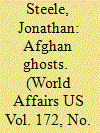

|
|
|
| 2 |
ID:
091298
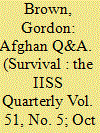

|
|
|
|
|
| Publication |
2009.
|
| Summary/Abstract |
You, sir, refer quite frequently and properly to the alliance and to what our allies are doing … But if one is to read the press in this country, one would believe that we were the only people out there, we were the only people making any effort, we were the only people taking any sacrifices. In fact we are, of course, a small if not a vital part of a very much larger alliance, of which the United States are making by far the greater contribution and suffering the greatest losses … We have got obligations as allies which we cannot weasel out of … Our success [in Afghanistan] is the success of the West as a whole, not simply of this country. And our contribution there goes very much more deeply than simply establishing stable governance in Afghanistan: it is establishing the success, the self-confidence of the West under a very, very heavy general threat. So, would you not agree, sir, that … so long as the Americans are there we've got to be there as well?
|
|
|
|
|
|
|
|
|
|
|
|
|
|
|
|
| 3 |
ID:
191441
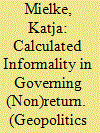

|
|
|
|
|
| Summary/Abstract |
Afghans’ protracted displacement is a geopolitical legacy from the Cold War. Although Pakistan’s return policymaking has foreseen the complete voluntary return of Afghans since the end of the Cold War, then as now, about three million Afghans reside in Pakistan. This article advances the notion of calculated informality to dissolve this seeming contradiction. Pakistan’s policymakers have excelled in calculated informality by successfully navigating the domestic and geopolitical arena over time based on practices of deregulation and ambiguity. Methodologically, the article applies Evolutionary Governance Theory (EGT) to reconstruct Pakistan’s return governance path based on the analysis of legal documents, previous research and secondary literature. EGT reveals the dependencies and layering at work in return governance and points out how the geopolitical positionality of Pakistan has determined its return policymaking. The structured interconnectedness of path-, goal- and interdependencies illustrates rigidities of the governance path and why opacity and ambiguity in return governance persist.
|
|
|
|
|
|
|
|
|
|
|
|
|
|
|
|
| 4 |
ID:
140291
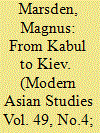

|
|
|
|
|
| Summary/Abstract |
While the territory of Afghanistan is widely connected in the popular and historical imagination to long-distance trade, Afghan society continues to be popularly represented as being made-up of ‘tribes’, who subscribe to static ‘honour codes’, and tenaciously cling to archaic tribal values. This article examines the significance of traders of Afghan background to commodity flows across a wide range of contexts in the former Soviet Union, especially in Russia and Ukraine and the Muslim-majority Central Asian Republics. It charts the social and political backgrounds of the merchants who make up this trading network, the nature of their connections to one another and the forms of mobility that make these connections possible, their complex relations with the communities amongst whom they live, and the types of moral value they attach to their work as traders.
|
|
|
|
|
|
|
|
|
|
|
|
|
|
|
|
| 5 |
ID:
149552
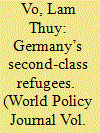

|
|
|
|
|
| Summary/Abstract |
Afghanistan is an increasingly dangerous war zone, but Germany refuses to offer safe haven to the majority of Afghan refugees. Journalist Lam Thuy Vo reveals that while Germany approved 96 percent of asylum applications for Syrians in 2015, Afghan asylum-seekers have less than a 50-50 shot of securing permission to stay.
|
|
|
|
|
|
|
|
|
|
|
|
|
|
|
|
| 6 |
ID:
089061
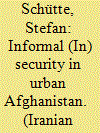

|
|
|
|
|
| Publication |
2009.
|
| Summary/Abstract |
Poverty and insecurity in Afghan cities are intricately intertwined with conditions of "informality." The term and the realities it describes refer to living situations in which basic needs and activities such as work, housing, and social security are unprotected by laws and standards. Immersion into such a convolution of informality determines the life of a majority among urban populations in Afghanistan and conveys a deep sense of insecurity for the urban poor. The paper looks at how rapid and unprecedented urban growth in Afghanistan goes along with rising levels of livelihood insecurity and explores how the urban poor cope with livelihood risks through a range of informal arrangements. Conceptually, the notion of "informal security regimes" helps capture informality as a coping strategy and how it relates to urban poverty in Afghanistan. Informed by extensive empirical fieldwork, the paper identifies different elements of the "informal security regime" in urban Afghanistan and explores their specific operations. The paper is mainly focused on the Afghan capital, Kabul, supplemented with evidence from other urban sites in Afghanistan.
|
|
|
|
|
|
|
|
|
|
|
|
|
|
|
|
| 7 |
ID:
148221
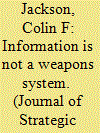

|
|
|
|
|
| Summary/Abstract |
While many militaries have tried to capitalize on the potential of information operations in internal war, few have succeeded. I argue that military information campaigns fall short of expectations for two reasons. First, the theory of influence militaries generally embrace – communications as a non-lethal weapons system – is largely invalid. While treating information as a weapons system makes it easier to integrate it into the existing military planning system, this overstates the independent effects of communications on behavior and understates the importance of interactive effects of what commercial marketing theory refers to as the “marketing mix” – product, price, promotion, and placement. It would be more appropriate to treat military information operations as a form of marketing: a composite effort to induce a specific behavior in a target audience by applying a combination of material and ideational instruments. The marketing model suggests that the efficacy of information operations will depend not simply on the message and its delivery (promotion) but on the behavior the sender seeks to induce (the product), the costs of that behavior (the price), and the opportunities available for such behavior (the placement).
|
|
|
|
|
|
|
|
|
|
|
|
|
|
|
|
| 8 |
ID:
145929
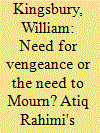

|
|
|
|
|
| Summary/Abstract |
It has been said of Atiq Rahimi's novel Earth and Ashes that the author intends it to convey a loss of any vision for a better future in Afghanistan. This essay neither disputes nor affirms this, but instead argues that this tone of disillusionment is sustained for a specific purpose—namely, to show how a belief in the Afghan requirement of vengeance helps sustain cycles of violence in Afghanistan. No critical work has explored this key motivation for the writing of the novel; this article does so using a method of close reading that enables an evaluation of the role the reader is afforded as part of this endeavor, be they natives or outsiders to this culture.
|
|
|
|
|
|
|
|
|
|
|
|
|
|
|
|
| 9 |
ID:
130489
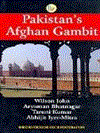

|
|
|
|
|
| Publication |
New Delhi, Har-Anand Publications Pvt Ltd, 2014.
|
| Description |
244p.Hbk
|
| Standard Number |
9788124117958
|
|
|
|
|
|
|
|
|
|
|
|
Copies: C:2/I:0,R:0,Q:0
Circulation
| Accession# | Call# | Current Location | Status | Policy | Location |
| 057719 | 320.654910581/JOH 057719 | Main | On Shelf | General | |
| 057819 | 320.654910581/JOH 057819 | Main | On Shelf | General | |
|
|
|
|
| 10 |
ID:
176272
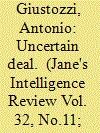

|
|
|
|
|
|
|
|